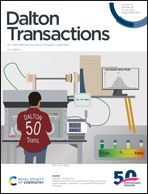Mitochondria-targeted cyclometalated rhodium(iii) complexes: synthesis, characterization and anticancer research†
Abstract
Over the past few decades, the landscape of inorganic medicinal chemistry has been dominated by investigations on platinum or ruthenium, while the research based on other metal centers such as rhodium has been relatively insufficient. In this work, a series of cyclometalated rhodium(III) complexes with imidazo[4,5-f][1,10]phenanthroline containing different aromatic rings were synthesized and characterized. Notably, all the complexes displayed stronger anticancer activity against various cancer cells compared with cisplatin. A mechanism study revealed that the rhodium complexes accumulated in the mitochondria, elevated the levels of mitochondrial reactive oxygen species (ROS) and released cytochrome c, indicating severe mitochondrial damage during the anticancer activity. Further studies illustrated that the rhodium complexes caused cell cycle arrest at the G2/M phase, upregulated the expression of p53 and reduced the ratio of B-cell lymphoma-2 (Bcl-2)/Bcl-2-associated x (Bax), which ultimately resulted in cellular apoptosis. Overall, through mitochondrial pathways, these Rh(III) complexes could induce cellular apoptosis to a larger extent than cisplatin and should be paid close attention as promising chemotherapeutic drugs in anticancer research.



 Please wait while we load your content...
Please wait while we load your content...